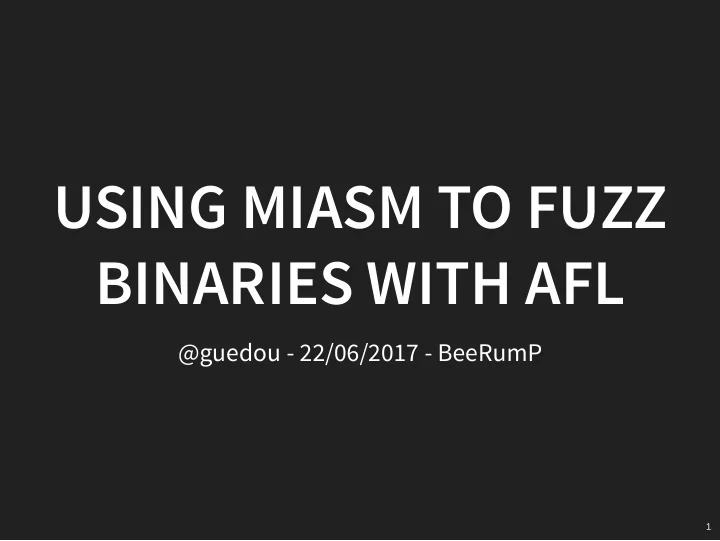

USING MIASM TO FUZZ BINARIES WITH AFL @guedou - 22/06/2017 - BeeRumP 1
WHAT IS AFL? A smart fuzzer that uses code coverage needs an initial corpus ~20 different mutations strategies only keep mutated inputs that modify coverage source instrumentation to discover new paths afl-as injects ASM a�er branches, labels, ... uses shm to talk to afl-fuzz Linux/*BSD only as easy to install as typing make See http://lcamtuf.coredump.cx/afl/ 2
THE TARGET: CRASH() $ cat crash.c typedef void (*function)(); void crash(char *data) { // The magic word is BeeR if (data[0] == 'B' && data[1] == 'e' && data[2] == data[1]) { if (data[1] && data[3] == data[0] + 16) { printf("ko\n"); function f = (function) *data; f(); // Please crash ! } else printf("!!\n"); } else printf("ok\n"); } 3 . 1
A SIMPLE MAIN() cat test.c // Typical AFL wrapper int main() { char buffer[BUFFER_SIZE]; // Clear the buffer content memset(buffer, 0, BUFFER_SIZE); // Read from stdin read(0, buffer, BUFFER_SIZE); crash(buffer); } 3 . 2
AFL SOURCE INSTRUMENTATION 4
USE AFL-(GCC|CLANG) only works on x86 =/ $ mkdir testcases findings $ echo "A" > testcases/test0 $ afl-gcc -o test_instr test.c crash.c $ afl-fuzz -i testcases/ -o findings/ -- ./test_instr ~6000 exec/s 5
USE AFL-CLANG-FAST - LLVM MODE clang instrumentation: no more ASM CPU-independent advantages: deferred instrumentation: __AFL_INIT persistent mode: __AFL_LOOP less fork() calls 6 . 1
A PERSITENT MODE MAIN() cat test-AFL_LOOP.c // AFL persistent mode wrapper int main() { char buffer[BUFFER_SIZE]; while (__AFL_LOOP(1000)) { // Clear the buffer content memset(buffer, 0, BUFFER_SIZE); // Read from stdin read(0, buffer, BUFFER_SIZE); crash(buffer); } } 6 . 2
$ cd llvm_mode; make; cd .. $ afl-clang-fast -o test-AFL_LOOP test-AFL_LOOP.c crash.c $ afl-fuzz -i testcases/ -o findings/ -- ./test-AFL_LOOP ~24000 exec/s 7
7 FUZZING A BINARY 8
DUMB MODE no instrumentation =/ $ gcc -o test_binary test.c crash.c $ afl-fuzz -i testcases/ -o findings/ -n -- ./test_binary ~2000 exec/s 9
QEMU MODE qemu instrumented with AFL code coverage tricks $ cd qemu_mode; ./build_qemu_support.sh; cd .. $ afl-fuzz -i testcases/ -o findings/ -Q -- ./test_binary ~1600 exec/s 10
QEMU & CROSS FUZZING fuzz any QEMU architecture on x86 uses a lot of RAM =/ $ cd ./qemu_mode/; CPU_TARGET=arm ./build_qemu_support.sh $ afl-qemu-trace ./test_afl_arm_static Hello beers ! ok $ afl-fuzz -i testcases/ -o findings/ -Q -m 4096 -- ./test_arm_binary ~1600 exec/s 11 . 1
ON A RASPBERRY PI 3 - MODEL B dumb: ~500 exec/s llvm: ~1000 exec/s AFL_LOOP: ~4000 exec/s 11 . 2
OTHER ALTERNATIVES From afl-as.h: In principle, similar code should be easy to inject into any well-behaved binary-only code (e.g., using DynamoRIO). Conditional jumps offer natural targets for instrumentation, and should offer comparable probe density. https://github.com/vrtadmin/moflow/tree/master/afl-dyninst https://github.com/ivanfratric/winafl https://github.com/mothran/aflpin 11 . 3
FUZZING WITH MIASM 12
WHAT IS MIASM? Python-based RE framework with many awesome features: assembly / disassembly x86 / ARM / MIPS / SH4 / MSP430 instructions semantic using intermediate language emulation using JIT ease implementing a new architecture ... See http://miasm.re & https://github.com/cea-sec/miasm for code, examples and demos 13
HOW? Using https://github.com/jwilk/python-afl instrument Python code like AFL to get code coverage data Building a miasm sandbox to emulate crash() 14
A SIMPLE MIASM SANDBOX $ cat afl_sb_arm.py from miasm2.analysis.sandbox import Sandbox_Linux_arml from miasm2.jitter.csts import PAGE_READ, PAGE_WRITE import sys import afl # Parse arguments parser = Sandbox_Linux_arml.parser(description="ARM ELF sandboxer") options = parser.parse_args() # Create sandbox sb = Sandbox_Linux_arml("test_afl_arm", options, globals()) # /!\ the last part of the code is on the next slide /!\ # 15 . 1
# /!\ the first part of the code is on the previous slide /!\ # # Get the address of crash() crash_addr = sb.elf.getsectionbyname(".symtab").symbols["crash"].value # Create the memory page sb.jitter.vm.add_memory_page(0xF2800, PAGE_READ | PAGE_WRITE, "\x00" * 1024 while afl.loop(): #<- py-afl magic #afl.init() # <- py-afl magic #if 1: # Read data from stdin and copy it to memory data = sys.stdin.readline()[:28] + "\x00" sb.jitter.vm.set_mem(0xF2800, data) # Call crash() sb.call(crash_addr, 0xF2800) 15 . 2
15 . 2 DUMB MODE $ py-afl-fuzz -m 512 -t 5000 -i testcases/ -o findings/ -n -- python afl_sb_arm Python jitter: ~8 exec/s $ py-afl-fuzz -m 512 -t 5000 -i testcases/ -o findings/ -n -- python afl_sb_arm GCC jitter: ~10 exec/s 16 . 1
AFL.INIT() $ py-afl-fuzz -m 512 -t 5000 -i testcases/ -o findings/ -- python afl_sb_arm Python jitter: ~2 exec/s $ py-afl-fuzz -m 512 -t 5000 -i testcases/ -o findings/ -- python afl_sb_arm GCC jitter: ~4 exec/s 16 . 2
AFL.LOOP() $ py-afl-fuzz -m 512 -t 5000 -i testcases/ -o findings/ -- python afl_sb_arm Python jitter: ~10 exec/s $ py-afl-fuzz -m 512 -t 5000 -i testcases/ -o findings/ -- python afl_sb_arm GCC jitter: ~180 exec/s 17
SPEEDING THINGS UP! miasm emulates printf() in Python =/ let's remove printf() calls and recompile it ! $ py-afl-fuzz -m 512 -t 5000 -i testcases/ -o findings/ -- python afl_sb_arm GCC jitter: ~2500 exec/s 18
BONUS HELPING AFL WITH MIASM DSE 19
KEY CONCEPTS AFL & SE: equally good / bad at findings generic / specific solutions AFL won't find unsigned ong magic = strtoul(&data[4], 0, 10); if (magic == 2206) printf("Fail ...\n"); the plan: 1. run AFL and stop when it gets stuck 2. use AFL outputs to solver constraints with miasm DSE 20
DEMO?
PERSPECTIVES generalize the DSE PoC instrument a binary using miasm pretend that the 'binary' is instrumented use the shm to update the coverage bitmap ! 21 22
Questions? Beers? https://guedou.github.io 23
Recommend
More recommend